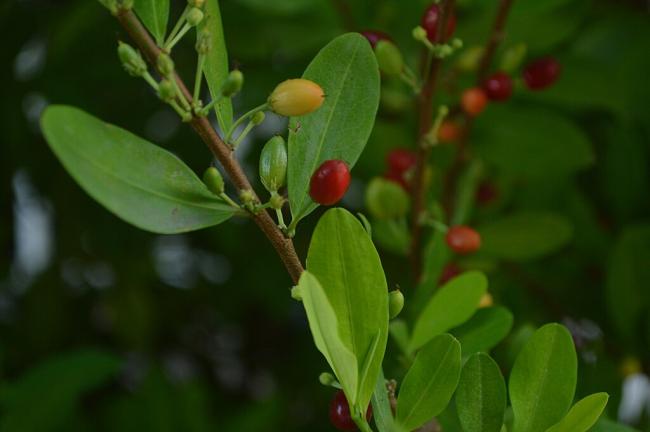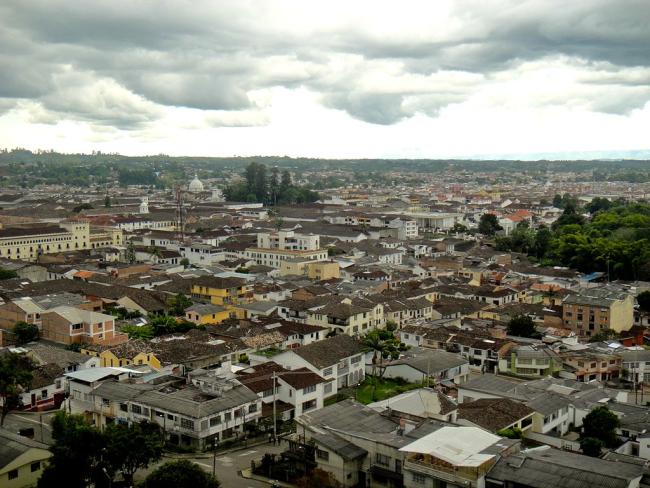
Leer este artículo en español.
"We aren’t killed by any weed. Neither coca, nor poppy, nor marijuana kill us. We are killed by hunger," said one of the members of the National Coordinator of Coca, Marijuana and Poppy Growers (Coccam) from the department of Cauca in Colombia. The comment was made in the context of a seminar on the regulation of cannabis for adult use held on June 22 at the University of Cauca, a discussion that proposed to broaden reflection on the articulation of alternative drug policies and pathways towards peace. From the academic sphere, the event brought together analysts, state representatives, producers, and consumers.
The leader's comment replicates a slogan raised during the presidency of Alvaro Uribe. With the aim of demonizing coca, he referred to it as “la mata que mata”—"the weed that kills" (or “the killer that kills,” reflecting the dual meaning of “mata” in Spanish). More recently, this classification was extended to other plants that are grown in Indigenous, Afro-descendant, and peasant territories and processed for uses that are mostly classified as illicit. Alongside coca, marijuana, opium, and poppy are also included.
Nevertheless, the demonized plants have recognized nutritional, therapeutic, and cosmetic virtues. Indigenous peoples repeatedly emphasize the ancestral, ritual, and healing role they play in their lives. Mantey Yu'ce Tasx, the name of one of the invited organizations, means "the remedies of yesteryear" in the language of the Nasa people, the importance of which was underlined during the aforementioned seminar in reference to "all the medicinal plants and animals that are in our environment."
The arrival of Gustavo Petro, the first leftist president in the country’s history, marked a shift to a "government of change." Petro’s aspiration for "total peace"—which foresees negotiations with all armed actors, including drug traffickers—implied reviewing the legitimacy/legality of the "prohibited crops," and thinking about their transformation instead of eradication or substitution.
On the basis of this commitment, Colombia joined Bolivia in demanding that coca be removed from the list of substances subject to international drug control during the United Nations Commission session on Narcotic Drugs in March of this year. Furthermore, during the first legislature of the Petro government, a bill in favor of the regulation of the recreational use of cannabis was presented and supported by Petro’s party.
Without dismissing these advances, the growers of northern Cauca insist on a clear demand: that producers and consumers be taken into account when it comes to drug policies and their regulation.

Changes in Drug Legislation
The Coccam delegate's words—and their resonance among participants—conveyed another powerful message. The Indigenous, campesino, and Afro-descendant communities dedicated to the cultivation of coca, marijuana, and poppy suffer multiple scourges. Those who benefit are others, while a combination of state neglect, lack of economic resources, and the presence of armed actors in their territories leaves little room to maneuver. In Colombia, Cauca is characterized for producing these three crops in addition to recording the highest number of assassinations of social leaders. With drug trafficking, "they brought us desolation, they brought us environmental disaster, and they left us with all these problems," said another of the producers. The growers are not identified here by name for security reasons, but all statements reflect consensus among the participants.
In the face of this problem, one of the points of the 2016 peace agreement signed between the Santos government and the Revolutionary Armed Forces of Colombia - People's Army (FARC-EP) pointed towards the "solution to the problem of illicit drugs." Through the substitution of illicit crops, the objective was to overcome the impoverished conditions of the communities involved in producing these crops through new productive opportunities.
In the same year, Congress voted in favor of the creation of a regulatory framework permitting the medical and scientific use of cannabis and its derivatives in Colombian territory under licenses granted by official entities. The ruling was subsequently ratified in 2017 and extended in 2021 to include other alternative and industrial uses of cannabis, including fiber, fertilizer, food, and beverages, among others.
Strengthening Change from the "Gobierno de Cambio"
The demand of producers and consumers has particular resonance in the current Colombian context. This was punctuated in recent weeks by a series of questionings around the figure of Gustavo Petro and his policies. On June 20, the country witnessed protest marches instigated by opponents of the president. On the same day, his labor reform proposal—central to his progressive agenda—and the prospect of legalizing recreational cannabis were defeated in Congress.
Contrary to what might be expected, the Caucan growers present at the university meeting expressed their relief at what could be seen as a setback in the implementation of new regulations. Several participants clarified: "If the bill had passed, we would have been left out. It is not in [government] offices that this drug policy is going to be made,” they added. “Inputs were not collected from growers and consumers."
Regardless of these positions, the growers do not intend to obstruct Petro's government. In this regard, one of them emphasized: "Our unions went to Bogotá. Many would think that we were there with the Uribistas, supporting [them]. No!" They emphasized the advances that have been made, which have contributed to destigmatizing both the plants at the center of the controversy and their producers and consumers, and provide the basis for preparing another bill. This time, one formulated as a result of a broad dialogue: "They gave us time to organize, to prepare a clear proposal and help build a policy where we all benefit, especially the planters and the consumers, who are very stigmatized," noted a union representative.
In the meantime, there are numerous problems that worry the producers of the northern Cauca region that must be oriented to the shifts expected from the “government of change.”
On the one hand, they feel at a disadvantage compared to the large companies and resources of the multinationals that are already engaged in legal use of the crops. Participants recalled that, of the 774 licenses granted by the Ministry of Health in 2016 for medical cannabis, only 22 were designated for Cauca. Growers also expressed fear of not being prepared to be successfully inserted in the new market. State support, they asserted, will be required: "If it is going to be legal, we are going to say 'Government, prepare us!’ We ask for infrastructure that can make us competitive.”
On the other hand, while the failed bill proposed the recreational use of cannabis linked to individual adult freedom, its implications might be less kind to those who produce the "raw material." Repeatedly accused of being drug traffickers, they are under pressure from those who—illegally—make a greater profit from their harvest, from its transformation, transport, and sale as a final product. For this reason, the growers began to organize themselves: "We got together to reflect, looking at the concerns we have in our territory. The violence, the armed groups... They have done everything to us. We are victims of this violence.”
(Self) Regulation "for Colombia and the World"
Beyond the difficulties they face, the growers of northern Cauca recalled the important connection of their labor with community life and their authorities: "We are the ones who have the knowledge of the crop, we are the owners of the seeds, and today we, as [an autonomous] government, as Indigenous authorities, as peoples, ask: how we are going to build this policy, from government to government?”
In the same line, he added: "We are not going to talk about illicit crops anymore. In my community, coca, marijuana, and poppy are not illicit."
From this perspective, the growers drew attention to their experience with a process they define as "self-regulation," carried out by their own associations. Self-regulation, they pose, could become a valuable source of inspiration for drug policy—on a par with the presidential ambition to turn Colombia into a "world power of life."
Among the growers' proposals, a commitment to care for the environment "for Colombia and the world" stands out:
"We carried out a process of self-regulation based on environmental care, on caring for the family, being aware that it is the land that we are leaving to future generations, [because] the cultivation of these plants for drug trafficking implies damaging our soils, our water sources... It implies deforestation... So it was necessary to regulate ourselves in terms of the quantity of plants, the inputs that we are putting into these crops, the sale prices we set."
At the same time, they aspire to ensure social investment within their communities, in order to strengthen food and economic autonomy: "We have been taught to depend, to be beggars, and we do not want to continue being beggars. We want to have our own business, our own economy."
Faced with this challenge, the producers plan to "change the way we plant, so that it is done organically, without 'poison', so that it does no harm." Furthermore, they call attention to the many hectares of land that have been damaged by glyphosate, a product of previous governments that spent a lot of resources to eliminate coca, poppy, and marijuana.
Today, the growers are asking themselves "how can we give another life to these plants, how can we make them useful, without violence? Today we are looking for this to be transformed, and for the profits to go not to armed groups or big business entities, but to the communities themselves."
From the meeting with cannabis, coca, and poppy growers from Cauca, the need to rethink drug policy and its regulation was made explicit, as well as the need to open spaces for multi-stakeholder consultation. Because, as the participants affirmed, peace is not limited to the laying down of arms. Rather, "it is made in the family, having something to eat, having guarantees like education, health, roads, well-being, harmony..." In order to “live sabroso y sin miedo, as [Vice President] Francia Márquez says!” A tasty life without fear.
Virginie Laurent is a professor in the Department of Political Science at the Universidad de los Andes in Bogotá. She thanks Axel Rojas, Professor of Anthropology at the Universidad del Cauca.

